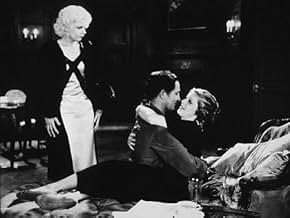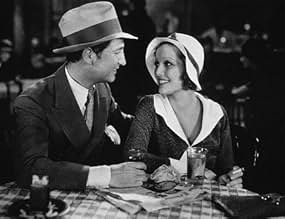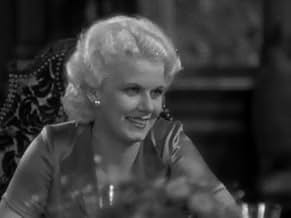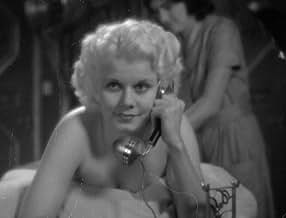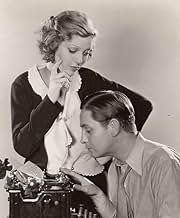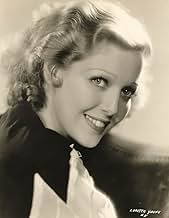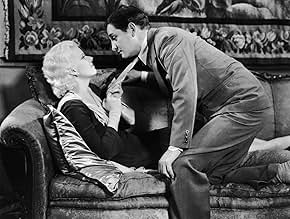VALUTAZIONE IMDb
6,7/10
3849
LA TUA VALUTAZIONE
Una giovane donna di una famiglia molto ricca sposa impulsivamente un giornalista, ma ognuno presume che lo stile di vita dell'altro sia quello che deve essere cambiato.Una giovane donna di una famiglia molto ricca sposa impulsivamente un giornalista, ma ognuno presume che lo stile di vita dell'altro sia quello che deve essere cambiato.Una giovane donna di una famiglia molto ricca sposa impulsivamente un giornalista, ma ognuno presume che lo stile di vita dell'altro sia quello che deve essere cambiato.
- Regia
- Sceneggiatura
- Star
- Premi
- 2 vittorie totali
Don Dillaway
- Michael Schuyler
- (as Donald Dillaway)
Claud Allister
- Dawson - The Valet
- (as Claude Allister)
Wilson Benge
- Butler
- (non citato nei titoli originali)
Vance Carroll
- Reporter
- (non citato nei titoli originali)
Eddy Chandler
- Hank - A Reporter
- (non citato nei titoli originali)
Richard Cramer
- Speakeasy Proprietor
- (non citato nei titoli originali)
Oliver Eckhardt
- Reporter
- (non citato nei titoli originali)
Bill Elliott
- Ann's Beau - The Round-the-World Flyer
- (non citato nei titoli originali)
Adolph Faylauer
- Party Guest
- (non citato nei titoli originali)
J.C. Fowler
- Reporter
- (non citato nei titoli originali)
Recensioni in evidenza
Platinum Blonde launched so many careers - the most infamous being Frank Capra and Jean Harlow. It is not a perfect film by any stretch of the imagination. The sound is bad, Harlow is terribly miscast, and poor Loretta Young struggles valiantly to bring depth to a part that is the filmic equivalent of wallpaper. As many have said before me, she and Harlow would have done well to reverse roles.
But the greatest on screen portrayal of fresh, modern, naturalistic acting (a style that later would be attributed to James Dean) is from the wonderful, refreshingly brilliant young Robert Williams in 1931!!!!! I would never mark this film as a masterpiece, yet I would encourage all struggling male actors to study this man's work as a prime example of how to dominate a scene without any artifice or aggression. Every time he enters a room, the whole film lights up, and every time he leaves, all the other actors seem to lose their purpose and energy.
I have never seen such simple perfection, and I am saddened to no end to learn of his untimely death at thirty-four, just as he was starting to get roles worthy of his genius. I could not get enough of this man's work, and regret having so little of it to view. An absolute must see for Robert Williams alone!
But the greatest on screen portrayal of fresh, modern, naturalistic acting (a style that later would be attributed to James Dean) is from the wonderful, refreshingly brilliant young Robert Williams in 1931!!!!! I would never mark this film as a masterpiece, yet I would encourage all struggling male actors to study this man's work as a prime example of how to dominate a scene without any artifice or aggression. Every time he enters a room, the whole film lights up, and every time he leaves, all the other actors seem to lose their purpose and energy.
I have never seen such simple perfection, and I am saddened to no end to learn of his untimely death at thirty-four, just as he was starting to get roles worthy of his genius. I could not get enough of this man's work, and regret having so little of it to view. An absolute must see for Robert Williams alone!
The most notable thing about this movie is Robert Williams unusual performance. I've seen performances like it but none of them were in 1931 and I was surprised I'd never heard of him. Turns out he *died* in 1931, and it's worth watching the movie just to see someone who could have been a star. The movie itself is quite enjoyable, although Harlow makes little impression as a society dame and it's difficult to believe the enticing Loretta Young could be any one's idea of "one of the boys."
After watching Platinum Blonde, I, like most other viewers, had to look up Robert Williams, wondering whatever happened to him while fearing the worst, the worst being true: he died shortly after he made this film. Tragic! One can wonder endlessly over what might have been. What is clear is that he was a natural for the camera, was highly skilled (years of stage experience behind him), and fit perfectly into the Capra-Riskind universe of tough-but- articulate Everyman up against monied mediocrities. He might well have ended up playing the Clark Gable role in It Happened One Night if he had been around at the time. In fact, the reporter he plays here seems like a first draft for that character. (The plot involves Williams as a reporter falling in love impulsively with the daughter of a wealthy Social Register family only to encounter the usual boobytraps built into such a union.)
The movie itself, though hard to separate from Williams's domination of it, stands up fairly well on its own. There are some imaginative camera movements and setups and intelligent, witty dialogue laced with fizzy Depression-era argot. The story is not very convincing but you suspend disbelief because of the way the actors, dialogue and cinematography bring it to life. The pace is leisurely, sometimes a bit too much so, with many minutes taken up in gentle, playful, ultra-naturalistic banter between Williams and his co-stars. I can't think of another film from that period that detoured so often into that type of throwaway conversational interlude.
Jean Harlow as the heiress and Loretta Young as a newspaper columnist are not ideally cast. Their roles should have been reversed, but it doesn't really matter because both actresses do well. Harlow, who by this time had had relatively little experience in front of a camera, seems right at home about 90% of the time. And it's hard to believe that Loretta Young was only 18 when she made this! But she had already been a veteran of several years standing as a film actress.
The movie itself, though hard to separate from Williams's domination of it, stands up fairly well on its own. There are some imaginative camera movements and setups and intelligent, witty dialogue laced with fizzy Depression-era argot. The story is not very convincing but you suspend disbelief because of the way the actors, dialogue and cinematography bring it to life. The pace is leisurely, sometimes a bit too much so, with many minutes taken up in gentle, playful, ultra-naturalistic banter between Williams and his co-stars. I can't think of another film from that period that detoured so often into that type of throwaway conversational interlude.
Jean Harlow as the heiress and Loretta Young as a newspaper columnist are not ideally cast. Their roles should have been reversed, but it doesn't really matter because both actresses do well. Harlow, who by this time had had relatively little experience in front of a camera, seems right at home about 90% of the time. And it's hard to believe that Loretta Young was only 18 when she made this! But she had already been a veteran of several years standing as a film actress.
Stew Smith is a salt of the earth, street smart, cynical wisecracking reporter who's proud of his $75 a week salary. While tracking a story about a rich kid involved in a breach of promise suit, he gets involved with the Schuylers. This group of nitwits is a super-rich family trying desperately to avoid bad publicity. Stew catches the eye of the gorgeous Ann Schuyler, and the two fall madly in love to the absolute horror of Anne's snooty mother (who unfortunately is afflicted with gastritis). Indeed, Stew and Ann actually get married--with predictably catastrophic results. How will the filmmakers deliver Stew out of Ann's arms and into the arms of Gallagher--the equally gorgeous reporter who's madly in love with Stew?
This wonderful Frank Capra comedy must have appealed greatly to the sentiments of the 1931 audience at the very depths of the Depression. The Schuylers (and their idiot lawyer Dexter Grayson) were everything that people loved to hate--snooty, superior, stupid, wholly undeserving of their vast riches. They are mocked ruthlessly, while Stew Smith and Gallagher, as worthy representatives of the working class, are portrayed with understanding and compassion. Stew briefly embraces the idle life of the super-rich (even to wearing garters), but, of course, this doesn't last long.
This is more than just a film for Frank Capra fans--it's a glorious spoof of the old-time newspaper business and a tasty bit of social history.
This wonderful Frank Capra comedy must have appealed greatly to the sentiments of the 1931 audience at the very depths of the Depression. The Schuylers (and their idiot lawyer Dexter Grayson) were everything that people loved to hate--snooty, superior, stupid, wholly undeserving of their vast riches. They are mocked ruthlessly, while Stew Smith and Gallagher, as worthy representatives of the working class, are portrayed with understanding and compassion. Stew briefly embraces the idle life of the super-rich (even to wearing garters), but, of course, this doesn't last long.
This is more than just a film for Frank Capra fans--it's a glorious spoof of the old-time newspaper business and a tasty bit of social history.
In The Films Of Frank Capra Citadel Film Series and in his memoirs, Frank Capra described Platinum Blonde as a film that Columbia did strictly as a moneymaker, no messages of social significance that would be found in his later classic work, just a nice girl-boy-girl comedy. Still and probably because Robert Riskin did some of the dialog I found plenty of things that would be instantly recognizable in Capra's more well known films.
The Platinum Blonde is of course Jean Harlow and this film title gave her the title she would have the rest of her short life. She's a society girl who sweeps reporter Robert Williams off his feet and into marriage much to the chagrin of her formidable dowager mother Louise Closser Hale.
Someone else is chagrined as well, Loretta Young who was only 18 when she made this film. Loretta and her sisters added a few years onto their ages in order to work back then. Loretta plays one of Williams fellow reporters who is known only by her last name of Gallagher. Just like Jean Arthur was known as Saunders in Mr. Smith Goes To Washington. Lots of similarities between the two though Arthur's character was far more sophisticated than Young.
Still Platinum Blonde more closely resembles Mr. Deeds Goes To Town. Williams is like Gary Cooper trapped in that big mansion. Only it was Cooper's own mansion that he inherited. Robert Williams is in on a pass and on a kind of probation so to speak, to see if he can adjust to life among the idle rich. In 1931 lots of people would have liked to have been given the opportunity.
The only one in the household he strikes up some kind of friendship with is butler Halliwell Hobbes. Note the echo business with them, it would be repeated in Mr. Deeds.
The week Platinum Blonde was released with reviews acclaiming Williams as a new star, he died of peritonitis. What an incredible loss, he was an actor with a breezy insouciance just like Robert Montgomery or William Haines over at MGM. He probably could also have done parts at Columbia that James Cagney was doing at Warner Brothers. Williams could have been Harry Cohn's first major star of the sound era. Anyway his comic timing was perfect and he steals the film from those two movie legends who were his leading ladies.
You'll also like Reginald Owen's portrayal as Harlow's family attorney and general busybody. Williams also deals with him in the way Gary Cooper ultimately dealt with his shyster.
Platinum Blonde is one of Frank Capra's best early films and watching it will make you sad though when you see Robert Williams and you will agree that he had a brilliant career ahead of him.
The Platinum Blonde is of course Jean Harlow and this film title gave her the title she would have the rest of her short life. She's a society girl who sweeps reporter Robert Williams off his feet and into marriage much to the chagrin of her formidable dowager mother Louise Closser Hale.
Someone else is chagrined as well, Loretta Young who was only 18 when she made this film. Loretta and her sisters added a few years onto their ages in order to work back then. Loretta plays one of Williams fellow reporters who is known only by her last name of Gallagher. Just like Jean Arthur was known as Saunders in Mr. Smith Goes To Washington. Lots of similarities between the two though Arthur's character was far more sophisticated than Young.
Still Platinum Blonde more closely resembles Mr. Deeds Goes To Town. Williams is like Gary Cooper trapped in that big mansion. Only it was Cooper's own mansion that he inherited. Robert Williams is in on a pass and on a kind of probation so to speak, to see if he can adjust to life among the idle rich. In 1931 lots of people would have liked to have been given the opportunity.
The only one in the household he strikes up some kind of friendship with is butler Halliwell Hobbes. Note the echo business with them, it would be repeated in Mr. Deeds.
The week Platinum Blonde was released with reviews acclaiming Williams as a new star, he died of peritonitis. What an incredible loss, he was an actor with a breezy insouciance just like Robert Montgomery or William Haines over at MGM. He probably could also have done parts at Columbia that James Cagney was doing at Warner Brothers. Williams could have been Harry Cohn's first major star of the sound era. Anyway his comic timing was perfect and he steals the film from those two movie legends who were his leading ladies.
You'll also like Reginald Owen's portrayal as Harlow's family attorney and general busybody. Williams also deals with him in the way Gary Cooper ultimately dealt with his shyster.
Platinum Blonde is one of Frank Capra's best early films and watching it will make you sad though when you see Robert Williams and you will agree that he had a brilliant career ahead of him.
Lo sapevi?
- QuizIn a 2008 interview, actor Christopher Plummer called Williams "...one of the most realistic comedians the screen had. He made Cary Grant look like he was overacting... To watch Robert Williams act was like seeing a comic using the Method, long before the Method became famous with Marlon [Brando] (Marlon Brando) and Monty [Clift] (Montgomery Clift)."
- BlooperWhen they are looking at the front page of "The Tribune Paper", in the headlines, the word "okay" is misspelled. It shows "It's okey with me."
The spelling of "OK" was not standardized for a long time. Writer Dashiell Hammett among others spelled it "okeh" and "oke",
- Citazioni
Dexter Grayson: Where were you yesterday?
Anne Schuyler: Oh, Stew and I went for a long ride. Dexter, is there any finishing school we could send him to?
Dexter Grayson: Yes - Sing Sing!
- ConnessioniEdited into 365 days, also known as a Year (2019)
I più visti
Accedi per valutare e creare un elenco di titoli salvati per ottenere consigli personalizzati
- How long is Platinum Blonde?Powered by Alexa
Dettagli
- Data di uscita
- Paese di origine
- Lingua
- Celebre anche come
- Platinum Blonde
- Luoghi delle riprese
- Azienda produttrice
- Vedi altri crediti dell’azienda su IMDbPro
Botteghino
- Budget
- 600.000 £ (previsto)
- Tempo di esecuzione1 ora 29 minuti
- Colore
Contribuisci a questa pagina
Suggerisci una modifica o aggiungi i contenuti mancanti

Divario superiore
By what name was La donna di platino (1931) officially released in India in English?
Rispondi
